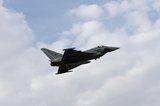South Korea approves missile programme funding, launches space rocket
South Korea successfully tested the L-SAM long-range missile in late February. (Gordon Arthur)
The Defense Project Promotion Committee of South Korea convened on 25 March, the day after North Korea lobbed an intercontinental ballistic missile into space, and approved ongoing spending on three surface-to-air missile (SAM) development programmes.
The first is the medium-range KM-SAM Block II (or Cheolmae II) interceptor, with KRW720 billion ($576 million) set aside for this programme lasting from 2023-29.
The KM-SAM Block II, first deployed in 2020, adds an anti-ballistic missile capability to its existing antiaircraft function. It can target incoming aircraft and missiles at altitudes beneath 20km. This funding will pay for the ongoing deployment of additional missiles.
Already have an account? Log in
Want to keep reading this article?
More from Defence Notes
-
![Singapore Airshow 2026: ST Engineering hints at export success for AME assault rifle family]()
Singapore Airshow 2026: ST Engineering hints at export success for AME assault rifle family
The Singapore-based technology company unveiled its new rifle family at this week’s airshow. Chen Chuanren spoke with the ST Engineering’s head of small arms to find out more about how the weapons have been refined.
-
![High tension in the High North – a wake-up call for NATO’s future Arctic defence efforts?]()
High tension in the High North – a wake-up call for NATO’s future Arctic defence efforts?
Any potential ‘Arctic Sentry’ mission would be months in the planning, but with tensions high in the region given the US’s push for Greenland, NATO countries will need to continue to emphasise their commitment to the region, analysts have said.
-
![Venezuela prepares personnel and equipment for a potential second US attack]()
Venezuela prepares personnel and equipment for a potential second US attack
Defence Minister Gen Vladimir Padrino López has declared that the Venezuelan armed forces “will continue to employ all its available capabilities for military defence”.
-
![As the new year starts, the UK defence spending delay continues]()
As the new year starts, the UK defence spending delay continues
The UK’s defence spending commitments remain uncertain as the government’s Defence Investment Plan, which had been due by the end of 2025, is yet to be published.
-
![How might European countries look to tackle drone incursions?]()
How might European countries look to tackle drone incursions?
Disruption of infrastructure in Europe, whether by cyberattack, physical damage to pipelines or uncrewed aerial vehicles flying over major airports, as has happened more recently, is on the rise. What is the most effective way of countering the aerial aspect of this not-so-open warfare?
-
![Taiwan approved for $11 billion weapon purchase from US]()
Taiwan approved for $11 billion weapon purchase from US
The US State Department’s approval of a multi-billion-dollar sale of weapons to Taiwan includes tactical mission networks equipment, uncrewed aerial systems, artillery rocket systems and self-propelled howitzers as well as anti-tank guided missiles.



























